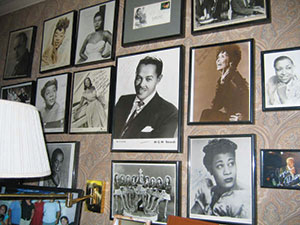
The world of jazz collecting can be wild, cool, and swinging.
By Kenneth Gloss
A great way to enhance warmer weather is to start a new collection of books and what better way than with than to focus on books about American-born music: jazz! If you happen to own a rare and used bookstore, as I do, and you happen to have a wife who collects books about jazz, as I do, it makes it pretty easy to find that elusive birthday or anniversary gift. Throughout the year, I put aside books that I know my wife will like, saving them for a surprise.
Collecting books on a favorite type of music can be fun and educational. Not only can you learn a great deal about the people who shaped and formed that type of music, but you can also trace your interests and find your own area of specialty. Music is such a wide and varied area that it helps to have a niche in order to collect books or ephemera on any particular type of music. I, myself, don’t collect books but Joyce, my wife does. She has about 1000 books on jazz in our home. Her collection started out simply, with just a few books more than 30 years ago. She’s always been interested in that area of music and she started out in a more general area, narrowing her interests as the years have passed.
When she attends bookseller conventions or goes on buying trips with me, she is just as busy hunting and searching for those particular books as I am hunting more generically with customers in mind. It gives her the same thrill as other collectors get to find that one needle in a haystack that she’s been seeking for years.
One of the more informative books she has in her collection is Jazz by Paul Whiteman, written in 1926. This is one of the few books on that subject that was written by a jazz musician. It’s worth at least $50 and has a great amount of history in it. This book is particularly interesting because it discusses the jazz scene in Japan. However, what really caught my wife’s eye was the Kodak picture of Ella Fitzgerald that was tucked inside the book. Fitzgerald had signed it, making the whole package worth a few hundred dollars. Many people didn’t take care of their books about music because they didn’t see them as future classics. When you find a book that is well cared for and has interesting features, like Esquire’s Jazz book from 1946, it can be worth a bit more. This book, which sells for about $50, was one of the cutting edge editions of its day. The design on the dust jacket and the pictures inside are exquisite.
People who collect music-related books and memorabilia really need to pinpoint exactly where their collection starts and what segments of the history it covers. With jazz, for example, saying you want to start at the beginning of jazz’s introduction can be tricky. It actually has roots in the spirituals and minstrels from decades ago. It evolved through the big band eras, enjoyed a strong movement in Europe, and then made a crossover to Broadway and Gershwin. Almost all American music can be related, in some shape or form, to jazz.
My wife’s collection has become more scholarly over the years as she weeds out some books and adds others. After more than three decades of collecting, she has become more discerning. As a result, specific books can be harder to find and she often has to search a lot longer and harder to find a particular title. It took her 15 years to find an autographed book by Charlie Parker because most musicians didn’t spend a lot of time signing their books. Sometimes, she’ll replace a book in her collection with a different edition. For example, she had a first edition of Lady Sings the Blues. Later, she found one with an inscription and bought that, selling the other one.
She also has some signed studio photographs of jazz greats. One of the photos she has doesn’t look like much at first glance. It’s a poster with a picture of Louis Armstrong playing. At the bottom is an advertisement for an appearance by Billie Holliday. However, Billie signed the poster with the words, “To Pops, who taught me everything.” That personal inscription makes that poster worth a great deal, both financially and sentimentally. The one book that stands out in my wife’s collection is To Bop or Not to Bop by Dizzie Gillespie. He was at one of the book conventions we attended. She went up to him and asked him to sign her copy. He not only signed her copy, but he also kissed her on the cheek. When she sees the book, she has a wealth of memories to go along with her find.
Her collection is a perfect example of the way a person can start amassing books in a certain area, for not a lot of money. Most of the books in her collection cost between five and 50 dollars. As a group of some 1000 books, they are worth much more as a collection than individually. The rewards she gets from finding another book about her favorite type of music far outweigh the monetary value, though.
And it also helps that her collection provides me with perennial ideas for her birthday!
Ken Gloss is the owner of the Brattle Book Shop in Boston, America’s oldest antiquarian bookstore. He is seen with some frequency on PBS’ Antiques Roadshow. 2013 is the 64th year of ownership by the Gloss family. Visit their website at: www.brattlebookshop.com or call them at 1-800-447-9595 for info on getting books appraised and his schedule of free and open talks.















Reader Comments